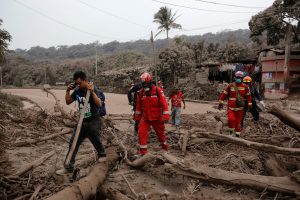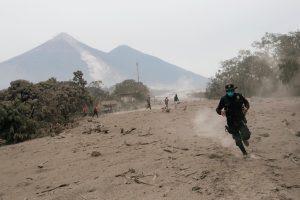
By Luis Echeverria
EL RODEO (Reuters) – A hot flow of mud, ash and gas swept down from Guatemala’s Fuego volcano on Monday, after a new explosion in the morning interrupted disaster workers pulling bodies from the brown sludge known as a pyroclastic flow that engulfed the village of El Rodeo.
The morning eruption also halted rescue efforts on the southern slopes of Fuego, Spanish for “fire”. The national disaster agency raised the death toll to 38 from 25 on Sunday, but it was unclear whether more bodies had been found or whether more people died in Monday’s eruption.

Firefighters tour an area affected by the eruption of the Fuego volcano as they look for bodies or survivors in the community of San Miguel Los Lotes in Escuintla, Guatemala, June 4, 2018. REUTERS/Luis Echeverria
The day after the volcano’s eruption, its biggest in more than four decades, residents in the capital Guatemala City woke to sweep ash from rooftops and streets. Technicians assessed whether the runway at the international airport was clear enough to restart commercial flights.
“The landscape on the volcano is totally changed, everything is totally destroyed,” government volcanologist Gustavo Chigna said on local radio.
A Reuters witness near the volcano said more people had been evacuated beyond a 5 mile (8 km) perimeter from the site after the new explosion.
Fuego, one of several active volcanoes in the Central American country, is near the colonial city of Antigua, a UNESCO world heritage site that has survived several volcanic eruptions. The latest activity from Fuego is mostly on the far side of the volcano, facing the Pacific coast.

A police officer runs away from a new pyroclastic flow spewed by the Fuego volcano in the community of San Miguel Los Lotes in Escuintla, Guatemala, June 4, 2018. REUTERS/Luis Echeverria
Around 300 people have been injured since the eruption on Sunday that sent columns ash and smoke 6.2 miles (10 km) into the sky, dusting several regions with ash.
CONRED shared a photo showing the flows of gas and mud sweeping down a mountainside and across a broad valley, engulfing a small village.
(Reporting by Luis Echeverria, Sofia Menchu and Milton Castillo, Writing by Daina Beth Solomon; Editing by Frank Jack Daniel and David Gregorio)